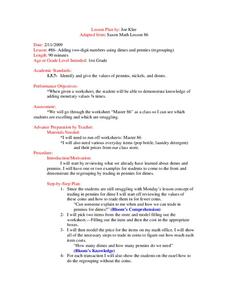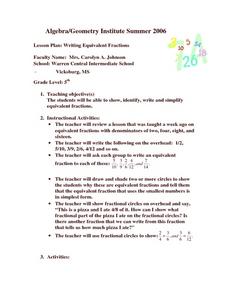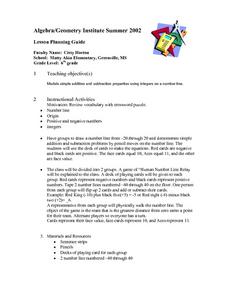Curated OER
Multiplying by 10, by 100, and by 1,000
Fourth graders write tenths and hundredths in decimal and fraction notations. In this math instructional activity, learners know the fraction and decimal equivalents for halves and fourths. Everyone answers numerous questions posed by...
Curated OER
Math-Measurement
First graders examine measurement. In this measurement lesson plan, 1st graders practice using nonstandard units to help in measuring objects. Students listen to How Big is a Foot and complete an activity using unifix cubes to measure...
Curated OER
Area
Young scholars solve problems involving area. In this geometry lesson plan, students calculate the area of an object and relate it to the area of the ocean. They define what exactly and area is and then solve problems relating to the...
Curated OER
Volume of Solid Figures
Learners calculate volume using the correct formula and the correct unit. They explore different prisms, spheres, cubes, and cones as they calculate volume and relate it to depths in oceans.
Curated OER
Adding Two-Digit Numbers Using Dimes and Pennies
First graders examine regrouping when adding, by using dimes and pennies to borrow. In this addition lesson plan, 1st graders work together as a whole group, working together with the teacher.
Curated OER
Veggie Chop and Data Analysis
First graders chop vegetables into fractions. In this fractions lesson, 1st graders cut vegetables, collect data about favorite vegetables and create a bar graph using the information. Students make inferences about the data and record...
Curated OER
Rounding Numbers
Fourth graders complete math problems where they round numbers to the nearest ten, hundred, or thousand. In this rounding lesson plan, 4th graders explain how to round the problems they solve.
Curated OER
Fractions, Decimals and Percents
Fifth graders describe parts of a whole as a fraction, decimal and a percent. In this math lesson, 5th graders practice converting fractions to decimals by dividing. Additionally, students explain how decimals are converted to percents.
Curated OER
Perimeter and Circumference
Students consider perimeter and circumference. In this lesson on perimeter, students will determine relationships between perimeter and circumference using real life examples.
Franklin College
Tell Time to the Nearest Half-hour and Relate to Events
Youngsters examine how to tell time to the nearest half-hour. They discuss why people wear watches, listen to the book "What Time Is It?" by Sheila Keenan, view examples on a model clock, and complete a worksheet with the teacher.
Curated OER
Multiplying Decimal Numbers: Using Zeros as Placeholders
Explore decimals with upper graders. They solve problems from their textbook involving decimal multiplication. Afterward, as a class, they check their answers by comparing them to those projected with an overhead projector.
Curated OER
Money
Second graders show combinations for $1.00. In this dollar combinations instructional activity, 2nd graders use nickels, dimes, and quarters to model and count combinations equaling $1.00.
Curated OER
Fractions - One-Half and One-Fourth
First graders identify and create the fractions one-half and one-fourth. The teacher first demonstrates how to create the fractions on a geoboard. The students then create one-half and one-fourth of a square, triangle, and a rectangle on...
Curated OER
How Many More on a Graph?
First graders examine data on a graph and determine which variable on the graph has more. They draw pictures of their family members and determine which families have more members than other families. Using squares of paper to depict...
Curated OER
Writing Equivalent Fractions
Fifth graders work to find the fractions that are equal to one another. They use a visual pie graph to show different values. Students are able to see how fractions can look different, yet have the same value.
Curated OER
Addition & Subtraction Properties With Integers
Sixth graders use a number line to solve addition and subtraction problems. In groups, they play a game of "Human Number Line Relay." They use a deck of cards to randomly create addition and subtraction equations and physically walk a...
Curated OER
Fractions
Fourth graders define and identify fractions. They draw a fraction with the correct number of equal parts, shade a specified number of parts, and write a fraction based on information from a variety of story problems. Students observe...
Curated OER
Ordering Objects By Length
Students compare and describe objects of differing lengths that are presented in a Mathkeys software compare mat. Working in pairs, one student is the chooser who sets up the objects while the other student is the sizer who puts the...
Other popular searches
- Saxon Math Lessons 1 20
- Saxon Math Lessons 36
- Saxon Math Lessons 8
- Saxon Math Lessons 50
- Saxon Math Lessons 36 40
- Saxon Math Lessons 28
- Saxon Math Lessons 116
- Saxon Math Lessons 101



















